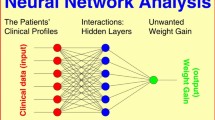Abstract
Weight gain induced by antipsychotics is the second most frequently given reason for noncompliance with pharmacologic therapy; excessive sedative effects rank first, with extrapyramidal side effects ranking third. Frequently, weight gain leads to inconsistent pharmacologic treatment; this exposes patients to the risk of recurrent symptoms. In fact, one of the key contributors to good clinical outcomes in schizophrenic patients is compliance with pharmacologic treatment. The goals of this study were to evaluate weight gain in a group of patients treated with olanzapine, diet modifications, and moderate physical activity and to compare the findings with those from a second group of patients who were given only olanzapine treatment. For 8 wk, investigators followed 2 groups of patients suffering from schizophrenia and hypomania in bipolar disorder, according to the nosographic criteria ofThe Diagnostic and Statistical Manual of Mental Disorders, Fourth Edition (DSM-IV). The first group (A) of 18 patients (9 female, 9 male) affected by manic episodes in bipolar disorder received olanzapine (10–20 mg/d), jogged lightly for 30 min 3 times a week, and complied with a diet that consisted of 500 kcal/d less than usual. The second group (B) of 10 patients (4 female, 6 male) with schizophrenia received only olanzapine (10–20 mg/d). All patients from both groups were weighed at the beginning of the observation period and weekly thereafter for 2 mo. After 2 mo of observation, group A showed a mean weight gain of 1.47 kg, whereas group B exhibited a mean weight gain of 3.5 kg; the difference between the 2 groups was almost 2 kg (P<.005). Group A showed a statistically significant reduction in weight gain compared with group B, clearly demonstrating the effectiveness of moderate physical activity and diet therapy in reducing weight gain in atypical antipsychotic treatment. Therefore, patient weight and body mass index must be monitored during the first weeks of antipsychotic treatment, with the goals of avoiding significant weight gain and treatment interruption.
Similar content being viewed by others
References
Hardman JG, Limbird LE, Goodman Gilman A (eds.)Goodman & Gilman’s The Pharmacological Basis of Therapeutics, 10th ed. New York, NY: McGraw-Hill; 2001.
Pijl H, Meinders E. Bodyweight change as an adverse effect of drug treatment.Drug Safety. 1996; 4:329–342.
Sussman N, Ginsberg D. Effects of psychotropic drugs on weight.Psychiatr Ann. 1999;29:580–594.
Zinnerman U, Kraus T. Epidemiology, implications and mechanisms underlying drug-induced weight gain in psychiatric patients.J Psychiatry Res. 2003;37:193–220.
Vanina Y, Podolskaya A, Sedky K, et al. Body weight changes associated with psychopharmacology.Psychiatr Serv. 2002;53:842–847.
Aquila R, Emanuel M. Interventions for weight gain in adults treated with novel antipsychotics: primary care companion.J Clin Psychiatry. 2000;2:20–23.
Birt J. Management of weight gain associated with antipsychotics.Ann Clin Psychiatry. 2003; 15:49–58.
Pancheri P. Farmacoterapia psichiatrica. Masson, ed; 2003.
Allison BD, Casey D. Antipsychotic-induced weight gain: a review of the literature.J Clin Psychiatry. 2001;62(suppl 7):22–31.
Marder SR, Essock SM. Physical health monitoring of patients with schizophrenia.Am J Psychiatry. 2004;161:1334–1349.
Melkerson K, Dahl ML. Adverse metabolic effects associated with atypical antipsychotics.Drugs. 2004;64:701–723.
Kurzthaler I, Fleischacker W. The clinical implications of weight gain in schizophrenia.J Clin Psychiatry. 2001;62(suppl 7):32–37.
LIGIO 1999 Linee Guida Italiane Obesità. Pendragon Edizioni Bologna.
Blin O, Micallef J. Antipsychotic associated weight gain and clinical outcome parameters.J Clin Psychiatry. 2001;62(suppl 7):11–21.
Taylor DM, McAskill R. Atypical antipsychotic and weight gain: a systematic review.Acta Psychiatr Scand. 2000;101:416–432.
Sussman N. Review of atypical antipsychotic and weight gain.J Clin Psychiatry. 2001;(suppl 23): 292–293.
Malhotra S, McElroy S. Medical management of obesity associated with mental disorders.J Clin Psychiatry. 2002;63(suppl 4):32.
Milano W. Dismetabolismi in corso di trattamento con antipsicotici: obesità e sindrome metabolica. Masson, ed; 2005.
Baptista T, Kin N, Beaulieu S. Obesity and related metabolic abnormalities during antipsychotic drug administration: mechanisms, management and research perspectives.Pharmacopsychiatry. 2002;35:205–219.
Wirshing D. Adverse effects of atypical antipsychotics.J Clin Psychiatry. 2001;62(suppl 21):7.
Kahn BB, Lier JS. Obesity and insulin resistance.J Clin Invest. 2000;106:473–481.
Henderson DC. Clinical experience with insulin resistance, diabetic ketoacidosis and type 2 diabetes mellitus in patients treated with atypical antipsychotics.J Clin Psychiatry. 2001; (suppl 27):10-14.
Bluher S, Mantzoros CS. The role of leptin in regulating neuroendocrine function in humans.J Nutr. 2004;134:2469S-2474S.
Monteleone P, Fabrazzo M, Tortorella A, May M. Pronounced, early increase in circulating leptin predicts lower weight gain during clozapine treatment.J Clin Psychopharmacol. 2002;22:424–426.
Monteleone P, Di Lieto A, Tortorella A, Maj M. Circulating leptin in patients with anorexia nervosa, bulimia nervosa or binge eating disorder: relationship to body weight, eating patterns, psychopathology and endocrine changes.Psychiatr Res. 2000;94:121–129.
Kraus T, Haack M, Schuld A, Kuhn M, Uhr M, Pollmacher T. Body weight and leptin levels during treatment with antipsychotic drugs.Am J Psychiatry. 1999;156:312–314.
Bromel T, Blum WF, Ziegler A, et al. Serum leptin levels increase rapidly after initiation of clozapine therapy.Mol Psychiatry. 1998;3:76–80.
Hagg S, Soderberg S, Olsson T, Mjorndal T. Leptin concentrations are increased in subjects treated with clozapine or conventional antipsychotics.J Clin Psychiatry. 2001;62:843–848.
Atmaca M, Kuloglu M, Tezcan E, Ustundag B. Serum leptin and triglyceride levels in patients on treatment with atypical antipsychotics.J Clin Psychiatry. 2003;64:598–604.
Baptista T, Lacruz A, Silvera R, Mendoza S, Hernandez L. Endocrine and metabolic profile in the obesity associated with typical antipsychotic drug administration.Pharmacopsychiatry. 2001;34:223–231.
Baptista T, Lacruz A. Endocrine and metabolic profile in obesity associated with typical antipsychotic drug-administration.Pharmacopsychiatry. 2001;34:223–231.
Bjorntorp P. Regional obesity. In: Bjorntrop P, Brodoff BN (eds.)Obesity. Philadelphia, Pa: JB Lippincott; 1992:579–586.
Baptista T, Reyes D. Antipsychotic drugs and reproductive hormones: relationship to body weight regulation.Pharmacol Biochem Behav. 1999;62:409–417.
Baptista T, Alastre T, Contreras Q. Effects of the antipsychotic drugs sulpiride on reproductive hormones in healthy men: relationship with body weight regulation.Pharmacopsychiatry. 1997; 30:250–255.
Haddad PM, Wieck A. Antipsychotic-induced hyperprolactinaemia: mechanisms, clinical features and management.Drugs. 2004;64:2291–2314.
Hester EK, Thrower MR. Current options in the management of olanzapine-associated weight gain.Ann Pharmacother. 2005;39:302–310.
Baptista T. Body weight gain induced by antipsychotic drugs: mechanisms and management.Acta Psychiatr Scand. 1999;100:3–16.
Baptista T, Lacruz A, Meza T, Herandez L. Antipsychotic drugs and obesity: is prolactin involved?Can J Psychiatry. 2001;46:829–834.
Mihara K, Kondo T, Suzuki A. Prolactin response to nemonapride, a selective antagonist for D2 like dopamine receptors, in schizophrenic patients in relation to Taq1A polymorphism of DRD2 gene.Psychopharmacology. 2000;149:246–250.
Wang GJ, Volkow ND, Logan J, et al. Brain dopamine and obesity.Lancet. 2001;357:354–357.
National Institutes of Health, National Heart, Lung and Blood Institute.The Clinical Guidelines on Identification, Evaluation and Treatment of Overweight and Obesity in the Adult: The Evidence Report. Bethesda, Md: NHLBI; 1998. NIH Publication No. 98-4083.
Aquila R. Management of weight gain in patients with schizophrenia.J Clin Psychiatry. 2002; 63(suppl 4):33–36.
Kurzthaler I, Flischacker W. The clinical implications of weight gain in schizophrenia. JClin Psychiatry. 2001;62(suppl 7):32–37.
Author information
Authors and Affiliations
Rights and permissions
About this article
Cite this article
Milano, W., Grillo, F., Del Mastro, A. et al. Appropriate intervention strategies for weight gain induced by olanzapine: A randomized controlled study. Adv Therapy 24, 123–134 (2007). https://doi.org/10.1007/BF02850000
Issue Date:
DOI: https://doi.org/10.1007/BF02850000




